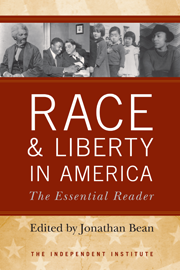Some 157 years ago, in 1852, the great abolitionist Frederick Douglass delivered his “Fourth of July Oration” condemning America for practicing slavery and thereby failing to live up to the humane ideals expressed by the Declaration of Independence.
“What, to the American slave, is your Fourth of July?” Douglass thundered. “I answer: a day that reveals to him, more than all other days in the year, the gross injustice and cruelty to which he is the constant victim.”
Douglass’s words might seem passé on Independence Day 2009, with Barack Obama occupying the White House, several black Americans serving as governors, and others running everything from the Republican National Committee to Fortune 500 companies. But the words of the Sage of Anacostia remain not only relevant, but essential. Why? Douglass unfailingly opposed any man’s exercising control over another, and he would be appalled, his writings suggest, by the new spirit of dependency and control ushered in with the Age of Obama. Douglass championed limited constitutional government, colorblind law, capitalism, hard work, and self-help. His principles are not the stuff of “New New Deals” but rather a brief for a “New Independence Day” based on small-government principles.
After he escaped slavery, Douglass allied himself with the uncompromising abolitionist William Lloyd Garrison of Massachusetts (one of the states with a black governor today), a firebrand who denounced the Constitution as “an agreement with hell.” At a Fourth of July rally, Garrison famously burned a copy of the Constitution. But in his 1852 oration Douglass broke with Garrison, calling our Constitution the “Glorious Liberty Document.” This sometimes is lost on modern readers of the speech, who tend to be overwhelmed by Douglass’s opening denunciation of American hypocrisy. In fact, Douglass was delivering a jeremiad—a type of speech well known to churchgoing Americans of the time. The form is this: First denounce the sins of the people, then offer salvation. Thus Douglass concluded: “I do not despair of this country. . . . ‘The arm of the Lord is not shortened,’ and the doom of slavery is certain.”
He is forever associated with slavery, but Douglass was much more than a “race man,” and that makes him all the more important to contemporary America. In an April 1865 speech to the Anti-Slavery Society of Massachusetts, Douglass defined freedom as “the right to choose one’s own employment.” He argued that “when any individual or combination of individuals . . . undertakes to decide for any man when he shall work, where he shall work, at what he shall work, and for what he shall work, he or they practically reduce him to slavery.”
After the Civil War, Douglass agitated against discrimination but never succumbed to the poisonous practice of race-based politics. In a world obsessed with skin color, Douglass stood up for colorblindness. “I conceive that there is no division of races. God Almighty made but one race,” he said. “You may say that Frederick Douglass considers himself a member of the one race that exists.”
One wonders how Douglass would view the race-designation boxes on today’s government forms or deal with our modern skin-deep “diversity” policies. Douglass’s Anti–Slavery Society speech suggests an answer. “What shall we do with the Negro?” he asked. “Do nothing with us,” he said. “Your doing with us has already played the mischief with us. . . . If the apples will not remain on the tree of their own strength . . . let them fall. . . . And if the Negro cannot stand on his own legs, let him fall also.” Douglass would not have advocated putting the government in charge of human happiness and economic advancement. “We may explain success mainly by one word,” he said, “and that word is Work! Work!! Work!!! Work!!!!”
Douglass understood the centrality of self-reliance to the American character. “Personal independence is a virtue,” he wrote, “but there can be no independence without a large share of self-dependence, and this virtue cannot be bestowed” by government. Even after our recent orgy of bailouts, and even as the culture of entitlement grips our country ever more tightly, Americans hunger for the assurance that we can do it for ourselves without a nanny state running our lives.
If today’s Republican party wants to move forward, it would do well to look backward, and it can begin by adding Douglass to the GOP’s annual Lincoln Day celebrations. After all, Douglass was a lifelong Republican who quipped that “the Republican party is the deck—all outside is the sea.” In doing so, Republicans should renew their commitment to the non-interventionist philosophy of Douglass and the virtues he extolled: work, thrift, self-reliance, and private enterprise.
Democrats should also learn from Douglass. President Obama echoed Douglass’s theme of transcending race, but he has not embraced Douglass’s belief that government discrimination by race or class is wrong. Obama has recognized rhetorically that Americans are “hungering” for “oneness,” yet he supports the writing into law of racial and class divisions—in the form of special programs, set-asides, and the like.
Douglass’s timeless vision of America celebrates both national and individual independence, in sharp contrast to the culture of entitlement and infantile dependence on the government’s management of our economic and personal affairs. On this Fourth of July, let us join Douglass in remembering that the Declaration of Independence laments the “swarms of Officers [who] harass our People and eat out their substance.” With new swarms of hungry officers gaining power in Washington, Douglass’s own declaration of independence offers an inspiring alternative.








